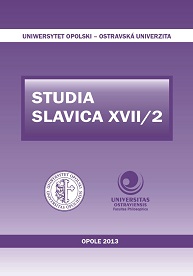Jugoslavske meziliterarni spolecenstvi a jeho rozpad v90é. letech minuleho stoleti
The Yugoslav Literary Community and its Disintegration in the 90s of the Last Century
Author(s): Miroslav KoubaSubject(s): Literary Texts
Published by: Uniwersytet Opolski
Keywords: Yugoslavian Literary Community; disintegration; national and cultural identity; national narrative; literary canon; interpretative models
Summary/Abstract: The paper is a contribution to the research on the relationship between language and the literary process in contemporary South-Slavonic literatures. At the first part this paper follows the disintegration of the Yugoslav federation in the 90s of the last century, which is accompanied by a „disintegration of language“. Formal disintegration of the Serbo-Croatian language and codification of the new literature languages also create conditions for new interpretive models of literary and cultural development in these countries. In connection with these socio-cultural changes we can also speak about the disintegration of the Yugoslav literary community in terms of Dionýs Ïurišin’s theoretical concept. The author of presented article tries to show that in the new social situation in the 1990s the importance of confession returns to foreground. The return ofreligion as an identification factor is significant especially for Bosnian Muslims. The Bosniaks also formulatetheir language program and its literary culture. Revitalized emphasis on religion can also be observed in Croatian society, where after 1991 were formed a relatively strong purist movement in the Croatian language. Finally, after 2006 – in connection with the referendum on the independence of Montenegro – develops similar language program in this country as in Bosnia and Herzegovina or Croatia about 10 to 15 years earlier. Yugoslav literary community we can relatively easily defined in terms of linguistic point of view, but culturological differences, which are focused primarily on confessional terms of Catholic, Orthodox, Muslim or Jewish tradition must be included in these considerations also. In the context of the so-called „late national movements“ (Miroslav Hroch’s theoretical concept) is concretized the second problematical point of this article. Newly established South-Slavonic literary canons are unable to find an adequate relationship to the common phases of cultural development. Begin to develop a literary interpretation disputes concerning literary themes of the old and new literary tradition. A typical example is the literature heritage of Bay of Kotor, which appropriates the Croatian, Montenegrin and Serbian literary narrative. There are many similarexamples, and it is the task of literary history will continue to seek suitable interpretive model of the South-Slavonic literary history.
Journal: Studia Slavica
- Issue Year: 17/2013
- Issue No: 2
- Page Range: 7-20
- Page Count: 13

